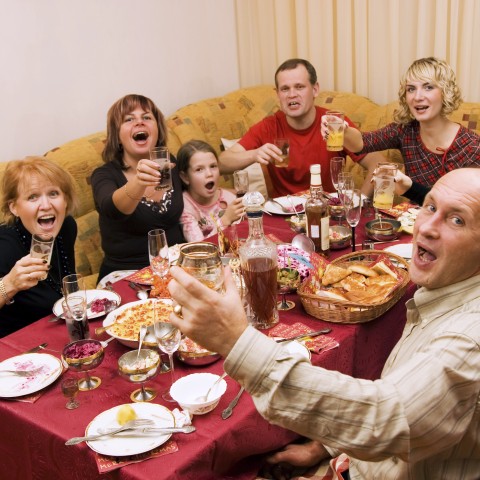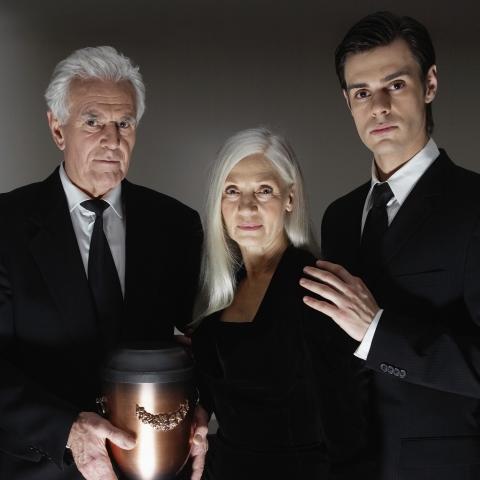Your romance with a lovely French local has gained momentum and the time has come for one of the most terrifying milestones of ‘serious’ relationships: meeting your mother-in-law. Whether she’s a gatekeeper mom or just genuinely interested in her daughter’s “one and only,” chances are, you’ll be asked a lot of questions that will make you say: “Damn, how do I say mother in French? Or father or family in French?”
When meeting your parents-in-law, or any random person before a work meeting or over a beer, the trick is to find some common ground and get the other person to talk about something they can relate to. Hence, before you get to know a person and learn about your common interests, talking about their family or yours is a highly effective icebreaker.
Besides, have you ever noticed how often our relatives randomly pop into seemingly unrelated conversations? “My wife this,” “My mother that,” “My brother has the same thing,” and “My cousin has done that too!” As soon as you get comfortable with the vocabulary and the basic structures, it will unveil a whole lot of conversation opportunities and a wealth of follow-up questions to keep it going!
Learn how to describe family in French with FrenchPod101’s guide to family in French for beginners, and never lack the proper word again!
Table of Contents
- French Family Vocabulary: Complete Family Word List
- Beyond the Blood
- How to Talk About Family
- The French Family is Changing Rapidly
- How FrenchPod101 Can Help You Learn More French Vocabulary
1. French Family Vocabulary: Complete Family Word List
Before we get to talk about our family or inquire about somebody else’s, we’re gonna need some serious vocabulary! But don’t worry about the size of the list, just pick and remember whichever ones apply to your situation and the ones you’re typically going to ask about (siblings, kids?). You’ll learn the rest in due time as you continue talking about family in basic French.
1- The Inner Circle
Here are the most basic family members in French, the ones you’ll likely talk the most about.
| La famille | “The family” |
| Un parent | “A relative” |
| Mes parents Mes vieux |
“My parents” “My folks” [Slang. Literally: “My old-ones”] |
| La mère Ma maman |
“The mother” “My mom” |
| Le père Mon papa |
“The father” “My dad” |
/! Do not confuse mon parent, meaning “my relative,” and mes parents meaning “my parents.
Un parent meaning “a relative,” and des parents meaning “relatives,” both refer to relatives of any kind, while mes parents (possessive plural) means: “my parents” (in the sense of: mother and father).
Examples:
- Je vais voir mes parents.
“I’m going to see my parents.” - J’ai des parents dans la région.
“I have relatives in the region.” - Comment vont ses parents ?
“How are his parents doing?” - Tu vis chez tes parents ?
“Are you living with your parents?” - Tu vis chez des parents ?
“Are you living with relatives?”
Tel père, tel fils. (Like father, like son)
| Les frères et soeurs | “The siblings” |
| La soeur Une grande-soeur Une petite soeur Ma soeur aînée |
“The sister” “An older sister / A big sister” “A younger sister / A little sister” “My elder sister” |
| Le frère Un grand-frère Un petit frère Mon frère cadet |
“The brother” “An older brother / A big brother” “A younger brother / A little brother” “My youngest brother” |
As you can see, there’s no specific word for “siblings” and we simply use “brothers and sisters.” For example, you could ask someone:
- Tu as des frères et soeurs ?
“Do you have siblings?”
| Les enfants Mes gosses |
“The children” “My kids” |
| Ma fille | “My daughter” |
| Mon fils | “My son” |
/! Be careful with the slang word gosses or “kids.”
In France, it’s very common and not overly familiar to use. However, in Canadian French, it has a completely different meaning and is vulgar slang for “testicles.” You can imagine how confusing these meanings could lead to some awkward misunderstandings.
2- French Extended Families
Extended family in French culture is important, so here are some words to help you start conversations about your loved ones outside your inner circle.
| La marraine | “The godmother” |
| Le parrain | “The godfather” |
I’m talking about the one sending money on your birthday, not Marlon Brando.
| Les grand-parents | “The grandparents” |
| La grand-mère Ma mamie Ma grand-maman Mémé |
“The grandmother” “My granny” “My grandma” “Granny” |
| Le grand-père Mon papy Mon grand-papa Pépé |
“The grandfather” “My grandpa” “My granddad” “Gramps” |
| Les arrière-grand-parents | “The great-grandparents” (Literally: “The back-grandparents” when translated.) |
| L’arrière-grand-mère Mon arrière-grand-maman |
“The great-grandmother” “My great-grandma” |
| L’arrière-grand-père Mon arrière-grand-papa |
“The great-grandfather” “My great-granddad” |
| Les petits-enfants | “The grandchildren” (Literally: “The little children” when translated.) |
| La petite-fille | “The granddaughter” |
| Le petit-fils | “The grandson” |
| Les arrière-petits-enfants | “The great-grandchildren” |
| L’arrière-petite-fille | “The great-granddaughter” |
| L’arrière-petit-fils | “The great-grandson” |
| La tante Ma tata / tatie / tantine |
“The aunt” “My aunt” (childish version) |
| L’oncle Mon tonton |
“The uncle” “My uncle” (childish version) |
| La cousine | “The cousin” (female) |
| Le cousin | “The cousin” (male) |
Make sure to visit our vocabulary list about Family Members, with audio recordings to practice your pronunciation. It’s available for free on FrenchPod101.
Famille nombreuse, famille heureuse. (Big Happy Family)
2. Beyond the Blood
Families extend beyond the people you share a blood relationship with. Let’s dive into the various types of these unrelated relatives.
1- Couples
Whether you’re in a relationship, engaged, married, single, divorced, separated, widowed, in a civil union, or in the type of situation Facebook describes as c’est compliqué (it’s complicated), talking about your marital status will often be useful.
| Ma petite amie Ma copine |
“My girlfriend” (Literally: “My little friend” when translated.) |
| Mon petit ami Mon copain |
“My boyfriend” |
| Mon ex | “My ex-boyfriend / girlfriend” |
| Ma femme Mon épouse |
“My wife” |
| Mon mari Mon époux |
“My husband” |
| Ma fiancée | “My fiancée” |
| Mon fiancé | “My fiance” |
| Ma compagne Ma partenaire Ma concubine |
“My companion” “My partner” “My concubine” |
| Mon compagnon Mon partenaire Mon concubin |
“My companion” “My partner” “My concubine” |
| Mon ex-femme Mon ex-épouse |
“My ex-wife” |
| Mon ex-mari Mon ex-époux |
“My ex-husband” |
| Ma maîtresse | “My mistress” |
| Mon amant | “My lover” |
2- In-laws
Once you get married, you strap yourself to a whole bunch of “in-laws” that, with a bit of luck and a lot of work, might become as close as your own relatives.
| Les beaux-parents | “The parents-in-law” |
| La belle-mère | “The mother-in-law” |
| Le beau-père | “The father-in-law” |
| La belle-soeur | “The sister-in-law” |
| Le beau-frère | “The brother-in-law” |
| La belle-fille | “The daughter-in-law” |
| Le beau-fils | “The son-in-law” |
Don’t you think that “beautiful mother” (belle-mère) or “handsome father” (beau-père) have a nicer ring to them than the legalish “mother-in-law” or “father-in-law?” As cheesy as it sounds, I feel like it helps to counter the negative association that many people have with the idea of having parents-in-law.
Meeting your “beautiful mother” (Belle-mère – Mother-in-law)
3- Recomposed Family
Blended or reconstituted families (when the parents have children from previous relationships, but all the members come together under one roof) are increasingly common in France, and are slowly becoming the new normal. They bring unexpected stepfathers, stepbrothers, and usually a lot of complications to work through everyone’s differences. But it can also make broken families whole again and take a turn for the better.
| La belle-mère | “The stepmother” |
| Le beau-père | “The stepfather” |
| La belle-fille | “The stepdaughter” |
| Le beau-fils | “The stepson” |
| La demi-soeur | “The stepsister” |
| Le demi-frère | “The stepbrother” |
| La demi-soeur | “The half-sister” |
| Le demi-frère | “The half-brother” |
/! Hold on! There’s something confusing here: does belle-mère stand for “mother-in-law” or “stepmother?” Both!
As inconvenient as it sounds, French uses the same set of words for parents-in-law and step-parents. But it’s not a problem, because it’s usually obvious from the context, right? Not always, and quite often, you’ll have to clarify who you’re talking about when referring to your “steps” or “in-laws.”
/! Wait…what about la demi-soeur? Is it the “stepsister” or the “half-sister?” Both!
Demi literally means “half” and demi-soeur perfectly translates to “half-sister.” But then, we don’t have words for the step brothers & sisters, and it’s common to use demi-frère and demi-soeur, to make up for the lack of better words.
I personally use zéro-demi (or “zero-half” in English) to emphasize the difference, but there’s nothing official about it, and you won’t find it outside of this article!
3. How to Talk About Family
Now that we have a strong arsenal of new words at our disposal, let’s see how you can use them in a conversation. First, we’ll see how to talk about your marital status, then how to mention them in various ways, and finally how to ask questions and learn more about your friends’ families.
1- Your Marital Status
You could be asked about your marital status by friends or colleagues, for paperwork by any administrative office, or by a potential romantic interest on a date. Either way, no time to get it mixed-up!
Start with:
Je suis _______.
“I am _______.”
And just pick from the list:
| en couple | “In a relationship” |
| marié mariée |
“married” |
| fiancé fiancée |
“engaged” |
| célibataire | “single” |
| divorcé divorcée |
“divorced” |
| veuf veuve |
“a widow” |
| pacsé pacsée |
“In a civil union” |
For example:
- Je suis marié.
“I am married.” [Masculine] - Je suis divorcée.
“I am divorced.” [Feminine] - Je suis célibataire.
“I am single.” [Same for both genders.]
Most of these words are self-explanatory, but let’s talk about the civil union for a minute. The pacs or PACS (Pacte Civil de Solidarité, or “Civil Solidarity Pact” in English) is, with the classic civil marriage, one of the two forms of civil union in France.
It was created in 1999, originally to give the same rights and legal protection to same-sex couples. Creating a new type of union instead of changing the traditional marriage was a clever way to not upset the conservative segment of the population, and it proved extremely successful.
Nowadays, the PACS is getting increasingly popular, especially for straight couples who find it more flexible and less bureaucratically heavy than getting married. They represent more than 95% of the total couples getting a PACS. Numbers are also showing that the PACS is slowly taking over traditional marriage.
Je suis mariée. (I am married.)
2- Questions and Answers About Family
With all the words that we’ve learned in the first part of this article, you’ll be able to talk about your family and ask the other person about their parents or brothers and sisters. Let’s have a look at the most common structures:
Est-ce que tu as _______ ?
“Do you have _______?”
Or simply:
Tu as _______ ?
“Do you have _______?”
For example:
- Tu as des frères ?
“Do you have brothers?” - Est-ce que tu as des cousins ?
“Do you have cousins?” - Tu as des enfants ?
“Do you have children?”
You can answer with:
J’ai _______.
“I have _______.”
Examples:
- J’ai une soeur aînée.
“I have an elder sister.” - J’ai deux frères.
“I have two brothers.” - Je n’ai pas d’enfants.
“I don’t have children.” - J’ai trois mères.
“I have three mothers.”
This one is guaranteed to raise a lot of questions at a dinner party.
3- Talking About Family Members
There are many ways you could mention your relatives, and a number of things you may want to talk about, but here are a few examples to help you get the basic structures and elaborate from there:
- Mes parents habitent à Toulouse.
“My parents are living in Toulouse.” - Mes parents sont divorcés.
“My parents are divorced.” - Mon père est décédé l’an dernier.
“My father died last year.” - Ma grand-mère est Brésilienne.
“My grandmother is Brazilian.” - Mon grand-père est photographe.
“My grandfather is a photographer.” - Mes grand-parents vivent en Floride.
“My grandparents live in Florida.” - Ma soeur aînée a deux ans de plus que moi.
“My elder sister is two years older than me.” - Mon demi-frère a bientôt vingt ans.
“My half-brother will be twenty soon.” - Ma femme s’appelle Maurice.
“My wife is called Maurice.”
Check out our Top 10 Quotes About Family on FrenchPod101.
Mes parents habitent en Transylvanie. (My parents are living in Transylvania.)
4. The French Family is Changing Rapidly
Over the last few decades, the very concept of family in France has evolved, mutated, and broadened its definition. The family unit in French culture is now a mix of modernity and tradition, and while some are celebrating those changes, others are claiming that this once “sacred” institution got lured by progress and lost its way.
Before 1950, the French family was traditionally composed of two parents and often many children, as abortion remained illegal until 1975. Couples were getting married young, often before their 20s, and didn’t divorce. The woman usually stayed home and was subject to the authority of her working husband.
Between 1950 and 2000, families began changing quickly. Divorces became increasingly frequent, as well as single-parent families. After WWII, women began emancipating, claiming more importance and freedom in and out of the household. More and more mothers started working, and the patriarchal system gave way to a more balanced separation of tasks and authority. French laws began evolving at the same time, reflecting these changes of mentalities.
After 1980, divorces and remarriage became commonplace, and three types of families were now frequently found all over France: “traditional” families, single-parent families (children raised by only one parent, usually the mother), and blended families (remarried partners living with children from former relationships).
Nowadays, the definition of the family has expanded a lot, thanks to the PACS (civil union) and the 2013 law on marriage and adoption for same-sex couples. 80% of women from 25 to 49 years old are working (even though income inequality remains an issue), and families are forming later in life.
The average age that mothers have their first child is around 30, and households rarely have more than one or two children. Children born outside of the traditional structure of a married couple are more and more frequent, with the rise of civil union or common-law union.
5. How FrenchPod101 Can Help You Learn More French Vocabulary
In this guide, you’ve learned a lot about how to talk about your family or ask about your friends’ relatives, from the giant word list to the most common questions and answers.
Did I forget any important words or expressions? Do you feel ready to get out there and reveal your most intimate family secrets, using everything you’ve learned today?
Make sure to explore FrenchPod101, as it has plenty of free resources for you to practice your grammar and learn new words. Our vocabulary lists are also a great way to revisit the words in this article and learn their pronunciation.
Remember that you can also use our premium service, MyTeacher, to get personal one-on-one coaching. Practice talking about your family in French with your private teacher so they can give you personalized feedback and advice, and help you with your pronunciation.
About the Author: Born and bred in the rainy north of France, Cyril Danon has been bouncing off various jobs before he left everything behind to wander around the wonders of the World. Now, after quenching his wanderlust for the last few years, he’s eager to share his passion for languages.


















